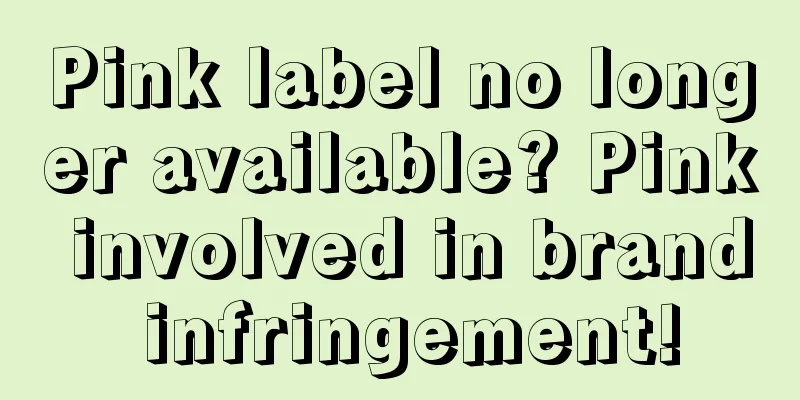Pink label no longer available? Pink involved in brand infringement!

|
01 Big IP complained, and a large number of people suffered ✦ I wonder how many Amazon employees still remember the smiley face infringement incident some time ago. It is the famous smiley face emoticon package. Smiley was originally designed in 1971 and was mainly used to decorate various items. After this pattern became popular, it was applied to various commodities and scenes, becoming the originator of the smiley face emoticon package. Just this July, Smiley Company launched a rights protection campaign to recycle Smiley labels and complained to a large number of sellers. Because of the huge influence of its IP, thousands of sellers were affected. Countless sellers fell into this huge pit. For a time, infringement complaints from big IPs became a nightmare for Amazon sellers - eating hot pot and singing songs, and suddenly being robbed by bandits, don’t you think it’s unfair? I never thought that not long after the smiley face incident, another large-scale infringement complaint occurred in the past two days: Pink entries also began to involve infringement. Is the Pink label infringing your rights? Then how will the color pink be represented in the future? "I heard that there are links to pink recently." "Every color has been registered, no one should use words related to colors anymore (covering face)." "Aren't Valentine's Day and Chinese Valentine's Day all pink?" "If you can successfully register a color word, doesn't that mean you can just wait to get paid?" 02 Who is Pink? ✦ Why can pink be registered as a brand? Isn't this just a private lock on a public bus? But if the name is a celebrity, it will be much easier to register a trademark. Pink is the name of a famous American female singer. The plaintiff, Ceremony of Roses Acquisition LLC, is engaged in the business of manufacturing, distributing and selling all kinds of merchandise . All kinds of merchandise sold and distributed at concerts and retail stores of music performers, including but not limited to tour books, T-shirts, hats, buttons and posters. The plaintiff's lawsuit letter describes 100 defendant sellers, and the trademark being defended is the registered trademark PINK (Class 9 and Class 41) of the singer "Pink Sister" (Alecia Beth Moore Hart). In addition to being a singer, Pink Sister is also a songwriter and actor. As of October 2009, she has sold 30 million records worldwide. From July 31 to August 1, Pink Sister PINK will hold a concert at Fenway Park in the state where the case is filed. At present, the plaintiff has applied to the court for a TRO injunction, and the freeze is expected to begin as early as next week. If there are sellers involved in this label, they should check their labels as soon as possible and handle them properly to avoid having their stores suspended. 03 How to deal with copyright infringement? ✦ However, if Pink involves infringement, then how should pink be represented in the future? Can pink products no longer be labeled? In order to find joy in adversity, Amazon employees began to show their magical powers. Some people suggested synonym replacement. Since pink is not allowed, then use something with similar meaning: Blush, rose-tinted, ruddy... But these terms are so obscure, will buyers really get them if they are posted? Some people also say that it is case-sensitive, and the trademark PINK is written as Pink, piNk, P! nk... and so on. Is there something weird mixed in? However, trademarks are not case-sensitive, so no matter how you change them, it will be in vain and the defendant will still be sued. Someone else had an idea: Will I get caught if I write it as PinkPink? answer: The question is, what should we do when we encounter such a thing? Regarding the Pink incident, as a term with a wide range of uses, the infringement of "Pink" does not involve all categories, but is specifically prohibited in the term. The plaintiff's business owner sells and distributes various types of goods at music performers' concerts and retail stores, including but not limited to tour books, T-shirts, hats, buttons and posters. Therefore, it cannot be used in the 9 categories and 41 categories that this brand mainly involves. In other categories, the term pink does not involve infringement issues. In other words, if it is not in category 9 or 41, there is no problem. If it is in the category, the entry needs to be removed or modified. Amazon has always been very strict on infringements. Once brand copyright issues are involved, it is likely to lead to link removal, store closure, or even prosecution. Patent infringement is divided into three types: patent infringement, copyright infringement, image infringement, and trademark infringement. Patent Infringement To avoid patent infringement, when selecting products, you should obtain relevant information through multiple channels, consult suppliers, consult peers, and identify whether there is infringement. Copyright Infringement Amazon copyright infringement generally involves copyright infringement of classic images (robot detection) and theft of other people's images (complaints from all owners) Image infringement If you see product pictures from other stores being used directly, the seller who took the original pictures can file a complaint using the original pictures. To avoid copyright infringement, sellers can complete the picture production themselves or outsource it to an art studio. Trademark Infringement It is an infringement to use the other party's registered trademark listing without the official authorization of the product brand, or to write other people's trademarks in your own listing title, five-line features, product description, search term keywords and other detailed information when publishing products. Sometimes big brands or big IPs will sue for infringement in batches, which often knock down a large number of unsuspecting sellers. When innocent sellers experience invalid links or even store closures, they will find out that some big shot has just launched a "rights protection" campaign. Paying attention to infringement issues has become the top priority. Only by keeping abreast of the latest public opinion on Amazon and following the trend of the times can we make steady progress, grow steadily, and have smooth sailing. Often, information bias becomes the key to widening the gap between sellers. It is particularly important at this time to join a relevant message group that shares important information every day. If you want to know more about the cross-border industry, you can scan the QR code below to join our sales circle. The group is currently full and there are more than a dozen people queuing up! |
<<: Replace ChatGPT? Amazon exclusive feature is launched!
>>: Amazon's Q2 profit rose sharply, and sales were proportional to advertising
Recommend
Amazon off-site promotion tips: How to reduce Facebook advertising costs?
Amazon sellers, are you still worried about Faceb...
Attention! Starting from April, FBA freight rates will rise again! Major shipping companies have begun to adjust freight rates and various surcharges...
As we enter the post-epidemic era, countries have ...
What is AiTaoCity? AiTaoCity Review
Aitao City is a cross-border e-commerce enterprise...
What is CARRO Group? CARRO Group Review
CARRO is an online automotive marketplace that pro...
What is xSellco? xSellco Review
xSellco is the only customer support desk built fo...
Force sellers to lower prices? Temu opens bidding mode for the same product!
According to the latest global e-commerce shopping...
Classic! The operational strategy for promoting new products does not consider losses!
text Traffic is very important to Amazon sellers....
Amazon’s infringement methods are beyond your imagination…
focus on First use the pink font Happy Fairy Day ...
The new US anti-counterfeiting bill has been implemented! How much impact will it have on cross-border sellers?
It is learned that the U.S. House of Representativ...
Amazon store is blocked? It may be due to these reasons!
In order to protect the interests of both buyers a...
What is Amazon Global Selling Manufacturing+? Amazon Global Selling Manufacturing+ Review
Amazon Global Selling Manufacturing Plus is a supp...
Must read!! What are Amazon’s new regulations?
1. Expand the scope of return processing fees: St...
5 pictures to understand the current development of Walmart in the United States
Walmart's head of sales Ryan Mayward recently ...
U.S. Candy Market Survey: Candy Sales Soar to $42 Billion in 2022
It is learned that according to the National Confe...
The US D2C market will exceed $150 billion in 2022! What are the secrets to success?
According to eMarketer's forecast, the US dire...









